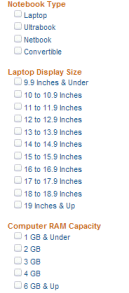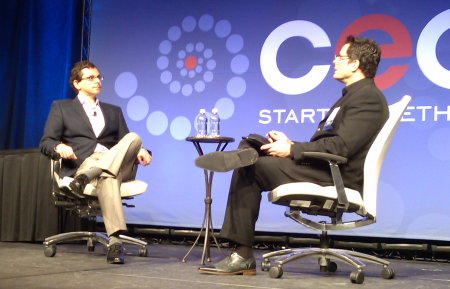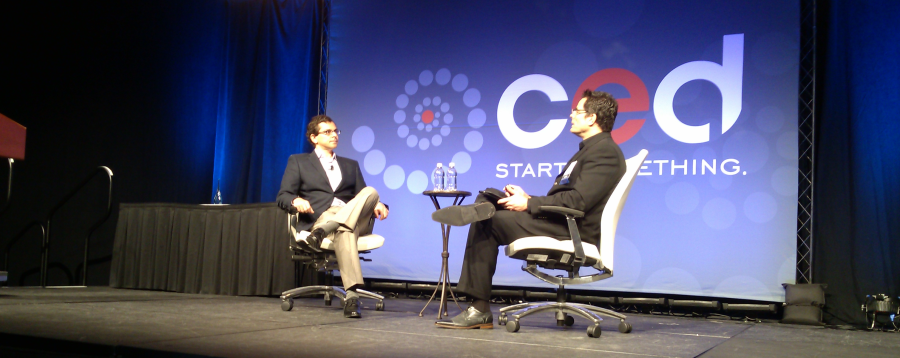 The penultimate session at the CED Tech Venture Conference 2013 was an in-depth interview of Pete Bell – Co-Founder of Endeca, which was acquired by Oracle for $1.075 billion in 2011 – conducted by David Berlind – The Editor-in-Chief of ProgrammableWeb. Endeca pioneered the concept of faceted search. Basically, if you have been to any eCommerce site in the past five years, you have seen faceted search. It is more-or-less a way to divide and structure unstructured data. To the left is an example of faceted search on Amazon.
The penultimate session at the CED Tech Venture Conference 2013 was an in-depth interview of Pete Bell – Co-Founder of Endeca, which was acquired by Oracle for $1.075 billion in 2011 – conducted by David Berlind – The Editor-in-Chief of ProgrammableWeb. Endeca pioneered the concept of faceted search. Basically, if you have been to any eCommerce site in the past five years, you have seen faceted search. It is more-or-less a way to divide and structure unstructured data. To the left is an example of faceted search on Amazon.
The interview was illuminating. Pete spoke to what he felt was a poor practice within the startup world. That is the planning for scaling on a massive scale; a focus on making you technology able to scale to 100+ million users before you are anywhere close. The majority of the interview built upon a talk that Bell gave at TedXBeaconStreet, entitled “Why Scaling Up Always Hurts.”
“When people have these conferences, they tend to become most interested in founding stories,” Bell began, “And then they talk about the end, ‘how did you exit?’ But they usually skip over the middle.” The middle, Bell went on to argue, is a series of doublings. Bell describe doubling in more detail:
We went from two people to five hundred people…it works out to something like eight doublings along the way. That’s just people. If you chart just about anything in a startup, if you pick a metric, it probably, if you are successful, will go through a similar series of doublings. It can be number of customers, funding, lines of code…What is strange about doublings is that in every day life, nothing behaves like this…So you have no real intuition about it.
Bell went on to use the construction of buildings as an example of doublings. When you start with a one-room one-floor hut, and double it to a two story building you have to use new technology and new construction methods. Double that two story building into a four story building, you have to use new methods and technology again. And so on, all the way up to the World’s tallest building, the Burj Khalifa in Dubai.
At each doubling along the way, methods and materials change. A problem that you solve at one doubling, can re-introduce itself at a later doubling. Bell gave the example of the elevator. The size and logistical mess created by skyscrapers was neutralized with the introduction of safety elevators. Problem solved, at least for a little while. Once the scale of construction reached the Burj Khalifa however, the same logistical problem presented itself again. Thus the original elevator would no longer do the job, which necessitated the invention of a completely new elevator.
Bell went on to discuss his experience with advisers and VC’s. Throughout the existence of Endeca as a sovereign entity, Bell noted, advisers and VC’s were looking at that final Burj Khalifa doubling. Bell gave an example from his time at Endeca, the Board of Directors wanted to build an international presence out of the belief that the company would go public in the near future. So they built international offices around the world, without any sort of a real idea how they would operate. It was what a large public company should do. “We closed all of them,” Bell said, “They [the VC’s] were planing a couple of doublings out.”
“The take away is, if you’re fortunate enough to double and make it to the next one, usually that’s what to do is to plan for the next one. That’s about as far out as you can see.” To which Berlind added, “Don’t spend too much time worrying about the 9th doubling, worry about the next one, and be prepared for a redo across several vectors. Whether it’s your employee base, or lines of code, your revenues.”
Ultimately, you have to get there. Bell’s closing statement really captured the essence of his message:
There is nothing wrong with ripping and replacing. It’s not wasteful to say the elevator we engineered for the 32 story building isn’t going to cut it in the Sears Tower, just rip it out and design a new one for that scale.
For the most part, when we tried to plan too far in advance we wound up building the wrong thing for a problem that turned out to be different than we anticipated, which can be more damaging than a redo.
Get there first, then worry about scale. Looking too far off into the future is often counter productive. Need something before you build it, don’t just build for what you think you will need five doublings in the future. Here is Pete Bell’s TedX Talk if you want to hear more about the follies of premature scaling.



Pingback: TechFaster | The New "New South" on Display at CEDTVC - TechFaster